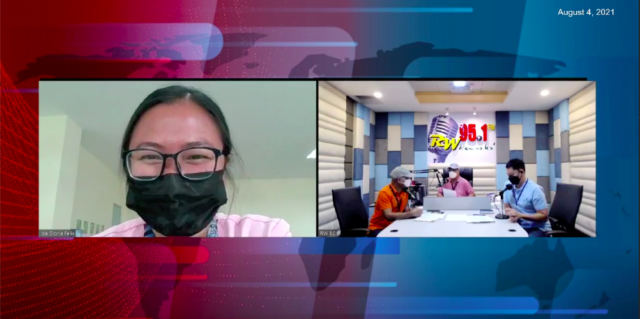Department of Health Central Luzon Regional Epidemiology and Surveillance Unit Head Ida Gloria Felix (left). (Jag Lyra D. Costamero/PIA 3)
CITY OF SAN FERNANDO, Pampanga (PIA) — Department of Health (DOH) Central Luzon urges the public to correctly follow the minimum public health standards to prevent the spread of COVID-19 particularly the Delta and other variants of concern.
These include proper wearing of face mask and face shield, frequent handwashing or sanitizing, physical distancing of at least 1 meter, and ensuring proper ventilation.
“Even before the presence of the variants of concerns, the government has been doing actions in strengthening the BIDA Solusyon Plus sa COVID-19,” DOH Regional Epidemiology and Surveillance Unit Head Ida Gloria Felix said.
In addition, Felix shared that DOH is strictly monitoring areas in the region with clustering or sudden increase of cases, and coordinates right away to their respective local government units (LGUs).
“We should have continuous preparations to strengthen our local health system capacities. We have to make sure that all of our resources are available, especially in the provinces with cases of the Delta variant,” she pressed.
The agency also recommends granular lockdowns to LGUs with recorded cases of the highly transmissible strain for effective containment and mitigation.
Meanwhile, DOH underscored that Central Luzon achieves its daily vaccine coverage target as it is bent on speeding up the RESBAKUNA vaccination drive.
“For the DOH side, we are continuously doing demand generation activities to urge the citizens to have themselves vaccinated. With the threat of the Delta variant, the demand for vaccination has increased as people got afraid of its transmissibility and effects,” Felix stressed.
About 1,905,235 residents in the region were already vaccinated, where 1,028,109 received their first dose; and 877,126 completed their jabs, as of August 1.
Moreover, DOH ensures continuous sample submission for surveillance or whole genome sequencing to boost the detection of the variants of concern.
“We are following an eligibility criteria, first, if the case or the sample swab is from the area with clustering of more than 20 positive cases. Next is suspected reinfection, or when a COVID-19 positive case, after two to three months, turns out positive again,” Felix detailed.
She added that when returning Overseas Filipino Workers are tested positive of the virus on the initial swab, they are automatically eligible for genome sequencing.
Aside from these, DOH is in close coordination with LGUs in the reiteration of the Prevent, Detect, Isolate, Treat, and Reintegrate Strategy to curb the spread of the disease.
“We have to do active case finding. We need to have a high-index of suspicion to the areas with clustering of cases. If there are instances like these, we should immediately identify our index case and do contact tracing within 24 hours,” Felix suggested.
She in turn reminded the LGUs to be mindful of the threat for the spread not only of COVID-19, but also airborne and food-borne diseases, on the evacuation centers given the inclement weather condition brought by the southwest monsoon, and recent tropical disturbances.
DOH reported that Central Luzon has a total of 152,151 confirmed Covid-19 cases as of August 9.
Of this figure, 91.6 percent or 139,307 have recovered; 5.9 percent or 9,019 are active cases; and 2.5 percent or 3,825 are mortalities.
The region also logged a total of 27 confirmed cases of Delta variant including 19 from Bataan; 4 from Bulacan; 2 from Pampanga; and 2 from Nueva Ecija, as of August 3. –Jag Lyra D. Costamero/PIA-3





